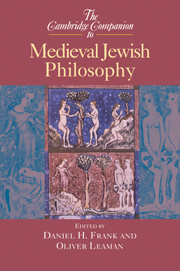Book contents
- Frontmatter
- PART I BACKGROUND AND CONTEXT
- 1 Introduction to the study of medieval Jewish philosophy
- 2 The biblical and rabbinic background to medieval Jewish philosophy
- 3 The Islamic context of medieval Jewish philosophy
- PART II IDEAS, WORKS, AND WRITERS
- PART III THE LATER YEARS
- Guide to further reading in English
- Index
3 - The Islamic context of medieval Jewish philosophy
In memory of Franz Rosenthal
from PART I - BACKGROUND AND CONTEXT
Published online by Cambridge University Press: 28 May 2006
- Frontmatter
- PART I BACKGROUND AND CONTEXT
- 1 Introduction to the study of medieval Jewish philosophy
- 2 The biblical and rabbinic background to medieval Jewish philosophy
- 3 The Islamic context of medieval Jewish philosophy
- PART II IDEAS, WORKS, AND WRITERS
- PART III THE LATER YEARS
- Guide to further reading in English
- Index
Summary
INTRODUCTION
Medieval Jewish thought flourished under the aegis of Islamic civilization from the ninth through the thirteenth centuries when the venue shifted to the Christian West. Its language was Arabic, its concerns determined by issues raised in the context of Islamic thought. The same issues (e.g. the nature of the divine, creation, prophecy, providence, human perfection, and immortality) were later pondered by Jewish thinkers in the Christian milieu, and Hebrew scientific terminology was modeled on Arabic.
For Islam, as for Judaism, the religious law is paramount, a comprehensive guide to life in all its aspects. Study of Qur’an, tradition (hadith), theology (kalam) and jurisprudence (fiqh) dominated Muslim intellectual life. The ‘ulama’ (clerics) regarded “the ancient sciences” as alien and useless, as an insidious threat to religious faith.
Ibn Rushd (Averroes) (d. 1198), a philosopher and jurist, justified philosophy as a religious obligation, but his opinion had no effect on the career of philosophy in Islam, which was emphatically rejected by religious authorities. Even the Tunisian historian Ibn Khaldun (d. 1406) felt the need to refute philosophy.
The medieval Islamic world had no universities as did Europe, where philosophy was taught alongside theology. Muslim rulers sponsored scientific research, which was institutionalized in libraries, hospitals, and observatories. Philosophers taught privately or to circles that met in their homes or in other venues such as bookstores.
- Type
- Chapter
- Information
- The Cambridge Companion to Medieval Jewish Philosophy , pp. 38 - 68Publisher: Cambridge University PressPrint publication year: 2003
- 4
- Cited by



